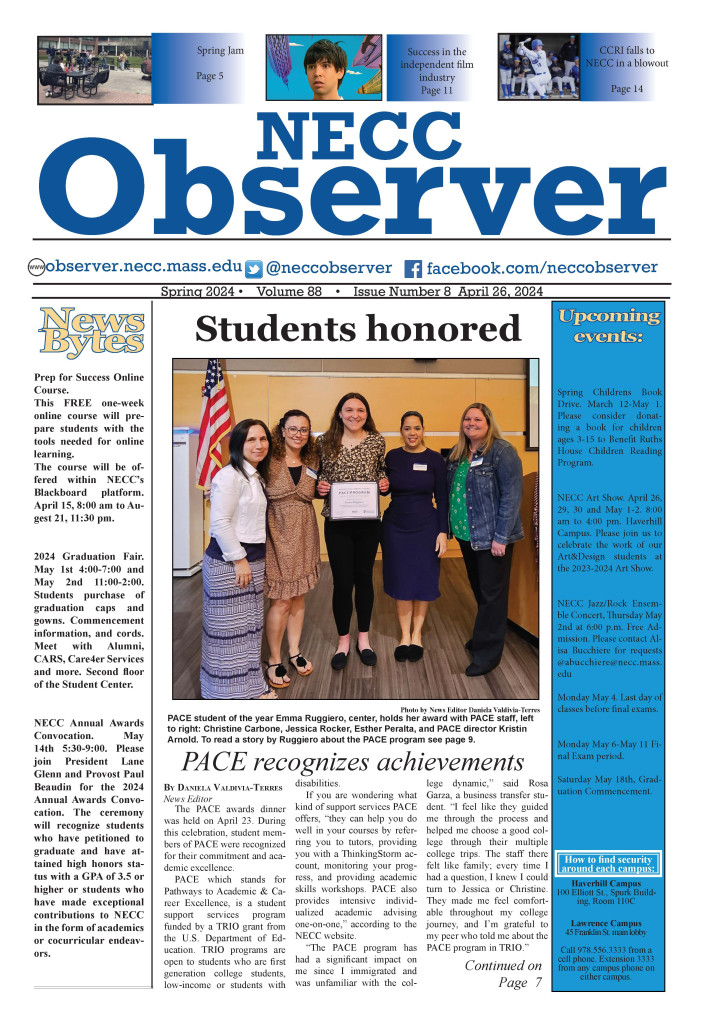A wise frog once said, “It’s not easy being green,” and although I can’t relate to Kermit the Frog’s plight, I can say for myself it’s not easy having an invisible illness.
Some may ask what that means, and that’s why the news editor is writing an opinion piece this week.
During the last staff meeting, Kim Whiting, editor-in-chief of the Observer, sat across from me as we spoke about the lack of verbage handed to able-bodied people to converse with those of us not afforded the luxury.
I was diagnosed with multiple sclerosis (MS) in May 2013. MS is a chronic neurological disease that affects the myelin in the nervous system. For those of you that have taken a psychology course here or back in high school, you may remember that the myelin are the protective coating around the pathways in the brain and spinal cord. MS deteriorates the myelin and causes the neurons that transmit signals in your nervous system to misfire.
To put it into simpler, more relatable terms: Imagine driving on the highway. The highway represents the pathways in your nervous system, your car is the signal to be sent and the driving conditions represent your health. You would like to take the next exit, which just happens to be an overpass. Depending on how poor the driving conditions are, you might end up missing the exit or getting on and having the overpass fall right out from underneath you.
Either way, you’re not in the best shape for getting to your destination.
On most days I look and act like any other 20-something college student. I take five classes, I work three jobs, I love going out with my friends and taking selfies with my dog. I look healthy for the most part, which is what makes my MS an “invisible” disease. While people see me as healthy, they don’t know I also just happen to be a self-proclaimed “walking pharmacy,” with seven different medical specialists and at least four appointments every month.
Then there are the days when my disease isn’t invisible.
Trust me, it’s awkward for me to walk around when I have my cane. I get a lot of weird looks from people whose minds I can’t read but whose faces scream, “What’s wrong with her?”
While speaking to Kim, she mentioned that it comes from a good place when people ask questions, even if they do hurt to answer.
My least favorite is, “What happened?”
I usually follow this up with, “It’s just my health acting up,” because it’s not like I fell and hurt my ankle or sprained something. My body is just deciding that it doesn’t want to function properly. This is something I’m currently riding out for an unknown amount of time.
Of course the hardest thing to hear is, “Get better soon.”
I know this is the most ambiguous, well intentioned thing a person can say to another, but it’s hard to hear when it’s not an option. Yes, I can lose the cane in a few days. The damage, however, going on in my brain and spinal cord is permanent and intermittently ongoing.
With the stress of finals and work, I recently had to miss some school, use my cane and have some tests done. Coming to campus with my cane is always a nerve-wracking experience. As a someone who doesn’t broadcast my condition, I just know someone is bound to ask questions, which is not worth the anxiety because it could potentially make my condition worse.
Of course everyone wants to say, “Just don’t think about it … It doesn’t matter what other people think.”
This is easier said than done. I’ve gone to school with breakouts, a rip in the crotch of my jeans and without makeup. I really don’t care in that way, this is another thing entirely to overcome.
I can’t speak for all of the invisible illness fighters in the world, or even on campus, but I can speak for myself. When you see someone with a cane, a walker or a wheelchair, don’t stare.
Hi, human being here just trying to go about my day.
Also, don’t be so quick to make an assumption that something “happened.” Instead of demanding answers about a possibly traumatic event, how about asking someone how they’re feeling?
Even if they’re using the assistance because of a car accident, a skiing incident or they fell down the stairs, how about you just ask, “How do you feel?” instead of, “What happened?”
How about, only if you mean it, “I’m here if you need anything,” instead of the command, “Feel better.”
One day I’m the tall brunette and the next I’m the cripple who’s faking it. People can holler all they want about the world becoming too politically correct, but step into the shoes of someone who lives both sides of the coin.
For more information on MS visit www.nationalmssociety.org.

